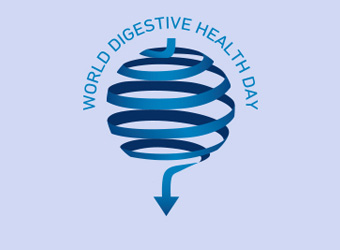World Digestive Health Day – wellbeing for digestive health
The World Gastroenterology Organisation raise awareness every year on 29th May with World Digestive Health Day http://wdhd.worldgastroenterology.org/. This year we are supporting the event by raising awareness of the role lifestyle and wellbeing have on digestive health.
The gut microbiota
The gut microbiota is the community of microbes (bacteria, viruses, fungi) that live in the gastrointestinal tract and in particular the large intestine (large bowel)2.
Why is the microbiota important?
The balance of your community of gut microbes is important to the health of the gut microbiota ‘ecosystem’ and your health. Think of it like a rainforest, where the health and survival of the plants and animals effects all the other species living there and the environment as a whole. The composition of the gut microbiota will therefore impact your health too.
Our gut microbiota has many helpful interactions with our body but three of the main functions are:
- Immune Function – supporting our immune system, the gut microbiota helps our immune cells differentiate between friendly bacteria and invading pathogens.
- Nutrition – helping our digestive system to absorb some minerals and synthesise some vitamins. Our gut microbiota also helps to break down dietary fibre.
- Gut-Brain – supporting our mood and behaviour through the gut-brain axis2
Some bacteria such as lactic acid bacteria – are associated with good health and bifidobacteria – with digestive health.
Gut microbiota – supporting wellbeing
Lifestyle factors like diet, physical activity, sleep and managing stress can support our gut microbiota.
- People who engage in physical activity regularly have a more diverse microbiota. Diversity is related to health3.
- Eating a variety of types of fibre in a diverse diet with lots of plants supports a more diverse and balanced gut microbiota. Additionally, eating enough fibre and plants in the diet supports digestive health4.
- The environment we live in will impact which microbes we are exposed to, how we socialise, who we live with and whether we have pets can determine the make-up of our microbes5.
- Stress can affect the balance of our microbes and cause gastrointestinal symptoms5. Stress management strategies such as, yoga, cognitive behavioural therapy and hypnotherapy are reported to reduce stress and gastrointestinal symptoms.
- Sleep quality is related to a healthy gut microbiota and sleep loss can impact our gut microbiota by altering appetite and stress hormones. Sleep deprivation leads to differences in the composition of the microbiota5.
Looking after your gut microbiota with delicious food for you, and your microbes couldn’t be easier with our recipes.
References
- World Digestive Health Day http://wdhd.worldgastroenterology.org/
- Gut Microbiota for Health https://www.gutmicrobiotaforhealth.com/about-gut-microbiota-info/
- Monda et al., (2017), Oxidative Medicine and Cellular Longevity, doi: 1155/2017/3831972
- McDonald et al., (2018), mSystems – ASM Journals, 3(3), https://doi.org/10.1128/mSystems.00031-18
- Gilbert et al., (2018), Nature Medicine, 24(4), doi: 1038/nm.4517


